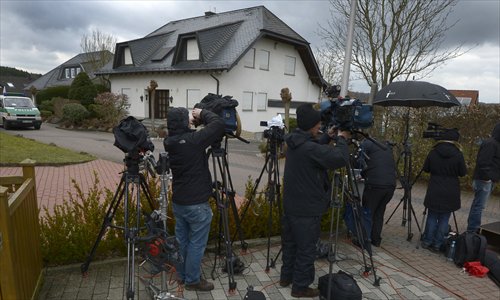HOME >> WORLD
Co-pilot killer ‘concealed illness’
Source:Agencies Published: 2015-3-27 23:33:01
Investigators search Lubitz’s house in quest for answers

Journalists stand on Friday in front of the house in Montabaur, southwestern Germany, where used to live the co-pilot who flew his Airbus into a French mountainside, killing all 150 aboard on Tuesday. Photo: AFP
German state prosecutors said on Friday they had found evidence that Andreas Lubitz, the Germanwings co-pilot who is suspected of deliberately crashing a passenger plane in the French Alps, killing all 150 aboard, had hidden an unspecified medical condition from his employers.
"Documents with medical contents were confiscated that point toward an existing illness and corresponding treatment by doctors," said the prosecutors' office in Duesseldorf, where the pilot lived and where the flight from Barcelona was heading.
"The fact there are sick notes saying he was unable to work, among other things, that were found torn up, which were recent and even from the day of the crime, support the assumption based on the preliminary examination that the deceased hid his illness from his employer and his professional colleagues," they said.
The prosecutors said in a statement that the documents were found in searches of Lubitz's homes in Duesseldorf and in the town of Montabaur in the state of Rhineland-Palatinate.
Lubitz may have suffered from serious depression, a German newspaper reported Friday, raising new questions over how he was cleared to fly.
The black box voice recorder indicates that Lubitz locked his captain out of the cockpit on Tuesday and deliberately sent Flight 4U9525 into the Alps, French officials say, in what appears to have been an act of both suicide and mass murder.
French Prime Minister Manuel Valls said that "everything is pointing towards an act that we can't describe: criminal, crazy, suicidal."
Lubitz sought psychiatric help for "a bout of serious depression" in 2009 and was still getting assistance from doctors, Bild Daily said, quoting documents from Germany's air transport regulator Luftfahrtbundesamt (LBA).
He was still receiving regular medical treatment, Bild reported, adding that Germanwings' parent company Lufthansa had transmitted this information to the LBA.
The paper also cited security sources as saying that Lubitz and his girlfriend were having a "serious crisis in their relationship" that left him heartbroken and distraught.
Lufthansa Chief Executive Carsten Spohr acknowledged at a news conference on Thursday that Lubitz had broken off his training in 2009 but did not explain why. He said there was nothing in the pilot's background to suggest he was a risk. "After he was cleared again, he resumed training. He passed all the subsequent tests and checks with flying colours. His flying abilities were flawless," Spohr said.
German police combed for clues in an apartment Lubitz used in Duesseldorf, but spokesman Marcel Fiebig told AFP there was no "smoking gun."
The tragedy has already prompted a shake-up of safety rules at airlines with several airlines announcing a new policy requiring there always be two people in the cockpit. German airlines have agreed to the new safety rule, the aviation association announced Friday.
Meanwhile, the UN world aviation body stressed that all pilots must have regular mental and physical check-ups.
German Chancellor Angela Merkel said the findings that Lubitz appeared intent on crashing the plane added an "absolutely unimaginable dimension" to Tuesday's tragedy, in which most victims were German and Spanish nationals.
Investigators say Lubitz's intention was clear because he operated a button sending the plane into a plunge.
French prosecutor Brice Robin played down the likelihood of Lubitz accidentally taking the plane down with an involuntary turn of the descent button.
"If you passed out and leaned over on it, it would only go a quarter-way and do nothing," Robin said, adding Lubitz, who had worked for the Lufthansa group since 2013, had set the controls to activate the plane's descent.
For the next eight minutes, Lubitz was apparently calm and breathing normally.
Recovery operations at the crash site were ongoing, with French officials trying to find body parts and evidence. A second black box, which records flight data, has not yet been recovered.
Lawyers who have represented families in past airline disasters told Reuters that potential lawsuits could focus on whether Germanwings properly screened the co-pilot before and during his employment, and on whether the airline should have had a policy requiring two or more people in its cockpits at all times during a flight.
Randy Knipping, a Toronto-based specialist in aviation medicine, said it was extremely difficult to conduct screening for psychiatric problems among pilots, in part because they can put their careers in jeopardy by admitting to such problems.
Posted in: Europe